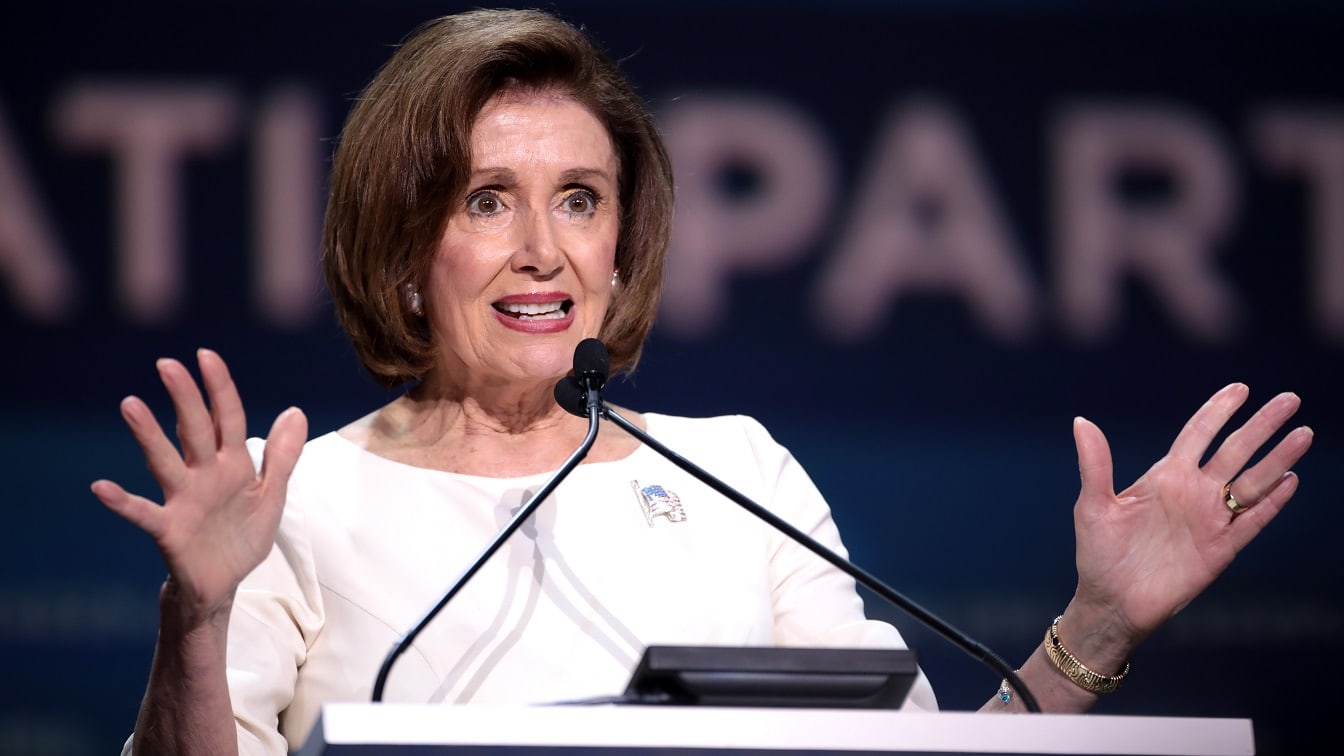Freshmen Democrat Sens. Jon Ossoff and Mark Kelly don’t seem a drain-the-swamp type nor mavericks ready to buck the party bosses. But they introduced legislation that is bound to get under the skin of House Speaker Nancy Pelosi, D-Calif.
Pelosi has been scrutinized for years about her fortunes with husband Paul Pelosi, a professional investor who recently bought millions in tech and entertainment stocks. After numerous reports about her colleagues gobbling up stocks and doing quite well, Pelosi defiantly asserted: “We are a free-market economy. They should be able to participate in that.”
The Ossoff-Kelly bill, dubbed the Ban Congressional Stock Trading Act, will require all members of Congress, their spouses, and dependent children to place their stock portfolios into a blind trust—ensuring they cannot profit from using privileged information to influence their personal stock trades. The family members would include Paul Pelosi. The bill would fine a member of Congress that violates the act their entire annual congressional salary.
The bill goes significantly farther than the current STOCK Act of 2012, a bill passed in response to journalist Peter Schweizer’s book, “Throw Them All Out,” about how members of Congress were using information only they were privy to guide their stock trading decisions.
The STOCK Act prohibits members of Congress and their staff from using privileged information about U.S. policy for financial transactions. It also requires members and staff to disclose stock transactions. But critics say the law is difficult to enforce and insufficient. It also doesn’t include family members or a blind trust.
House Minority Leader Kevin McCarthy, R-Calif., said if Republicans captured the House, he would like to see either limits or an outright ban on lawmakers holding and trading individual stocks, Punchbowl News reported. He said this could be only allowing investments in professionally managed portfolios or mutual funds or banning members from holding stocks in industries or companies their committees oversee.
Also, Reps. Chip Roy, R-Texas, and Abigail Spanberger, D-Va., introduced a similar bill in the House last year.
But the Ossoff-Kelly bill comes at such an interesting time, with the scrutiny aimed at Pelosi and her recent defense of the status quo.
So why would they do it?
In the case of Ossoff, he’s in the Senate in part because of this issue. The other part is because Donald Trump convinced enough Georgia Republicans their runoff votes wouldn’t count, but that’s another discussion.
Ossoff won his Senate seat in a runoff election against incumbent David Purdue. And Ossoff made plenty of hay over Purdue’s stock trading. The Atlanta Journal-Constitution reported that in the lead up to the COVID-19 shutdown in 2020, Purdue invested heavily in personal protective equipment. The Senate Ethics Committee cleared of any wrongdoing both Purdue and defeated Georgia Republican Sen. Kelly Loeffler—whose trades also came under suspicion. But the political damage had been done.
Kelly, like Ossoff, is from a battleground state where Democrat senators are exceedingly rare but broke through in an election cycle when Joe Biden flipped two traditionally red states blue. Also, the Georgia and Arizona Democrats are two of just 10 members of Congress that already put their stock portfolio in a blind trust.
However, it seems unlikely the proposals from either side of the aisle will go anywhere since too many members likely benefit from their privileged information for trading.
The American public has long had their suspicions about how public servants with salaries of $174,000 become multimillionaires. Everything is almost certainly legal, but that’s the swampy part, isn’t it? People on the public dole living privileged lives don’t pass the smell test for most Americans of either political stripe.
A December poll by the conservative group, Convention of States Action, found that 76 percent of voters say members of Congress and their spouses have an “unfair advantage” in trading stock, and that includes 70% of Democrats, 78% of Republicans, and about 80% of independents. The poll of 1,706 likely voters was done by the Trafalgar Group and released early this month.
It’s a free market but considering the level of information members of Congress are privy too, they definitely seem to have a leg up on your average investor. So, this could be a winning issue for McCarthy and Republicans to pick up—so long as kitchen table issues such as inflation are at the forefront.
That said, it’s easy to see how this might be a popular idea for politicians to talk about but would fall by the wayside in the post-election. Congress was never very good at reforming Congress. But the passage of the STOCK Act to begin with—even if insufficient—suggests public pressure can bring momentum.
Fred Lucas is chief national affairs correspondent for The Daily Signal and the author of “Abuse of Power: Inside The Three-Year Campaign to Impeach Donald Trump.”

